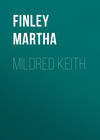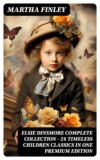Читать книгу: «Elsie at the World's Fair», страница 2
CHAPTER III
"On, we have a lovely view from here!" remarked Lulu as they reached the Dolphin's deck. "I'm not at all sleepy, papa; can't I sit here for a while?"
Grace was saying, "Good-night, papa."
He returned it with a fatherly caress, then answered Lulu's query.
"No, daughter; it is long past your usual hour for retiring, and as I want you to feel fresh and bright for to-morrow's pleasure, you, too, may bid me good-night and go at once to your berth."
"Oh, yes, sir, that will be the best, I know," she said, rising promptly from the seat she had taken, and with a loving look up into his face – for he was close at her side now. "What a happy thing it is for me that I have such a kind, wise father to take care of me!"
"A father whose strong desire it certainly is to make you and all his children as happy as possible," he said, laying a hand on her head and looking fondly down into her eyes. "Good-night, daughter, and don't hesitate to call me if anything should go wrong with you or Grace."
"Am I also under orders to retire, sir?" asked Violet with a mischievous smile up into his face, as Lulu bade good-night to the rest of the company and disappeared down the companion-way.
"Not from me," he said, pleasantly taking a seat at her side as he spoke. "Have I not told you many times that my wife does what she pleases? At least, if she fails to do so it is in consequence of no order from me."
"No; you have never given me one yet, and I believe I should like you to do so for once that I may see how it feels," she added with a low, musical laugh, slipping her hand confidingly into his.
"Perhaps you might not find it particularly agreeable," he returned, pressing the little hand tenderly in his. "But just to satisfy you I may try it one of these days. You are not disappointed in the Fair so far?"
"No, no, not in the least! Oh, how lovely it is! and what a beautiful view we have from here! How delighted our little Elsie and Ned will be with it all to-morrow. I hardly know how to wait for the time to come when I can see and share their pleasure."
But now the others were saying good-night and going down to their state-rooms, and the captain remarked laughingly that he thought the longed-for time would seem to come sooner if he and she should follow their good example.
"So it will," returned Violet, promptly rising and slipping her hand into his arm.
She went first to her mother's state-room, and the door being opened in answer to her gentle rap, "Are you quite comfortable, mamma, dear?" she asked. "Is there anything I can do or furnish to make you more so?"
"I am perfectly comfortable and I need nothing but a good night's rest, Vi, dear," was the smiling response. "Something which I want you to be taking as soon as possible. We find ourselves here surrounded by so much that is wondrously enticing to look at, that I fear we will be tempted to neglect needed rest, and so make ourselves ill."
"Ah, mamma, you and my husband are of one mind, as usual," laughed Violet, and then with a tenderly affectionate good-night they parted.
Both the captain and Lulu retained their old habit of early rising, and she joined him upon the deck the next morning just as the sun came peeping above the horizon.
"Good-morning, papa," she cried, running to him to put her arms about his neck and give and receive the usual morning caress. "Isn't this a lovely day? How we shall enjoy it at the Fair – that beautiful Court of Honor is just like the loveliest of fairylands."
"With which my eldest daughter is quite familiar, of course," he returned with amused look and tone, and smoothing her hair caressingly as he spoke.
"Well, I think I can begin to imagine now what fairyland may be like," was her smiling rejoinder. "Papa, mayn't I keep close at your side, going wherever you go?"
"That is exactly what I want you to do," he said. "I should be troubled indeed by losing sight of any one of my children, unless after putting him or her in the care of someone whom I could implicitly trust."
"I don't want to be in the care of anyone else, papa," she hastened to say.
"But it will be quite impossible to see everything here that is well worth looking at," he said, "and our tastes may differ greatly in regard to the things we care to examine."
"Still I care most of all to be with you, papa. I'm not afraid of getting lost, because I could easily find my way back to the Peristyle and wait and watch there for you and the rest, but I want to share in your enjoyment, and have you share in mine," laying her rosy cheek against his shoulder and lifting to his, eyes full of ardent affection.
"That is right," he said, smiling, and patting her cheek.
"Ah, here come your mamma, Gracie, and the little ones. You are early, my dear," to Violet as he handed her to a seat, took one at her side, drawing Grace to his knee for a moment's petting and fondling, then letting her give place to the younger two, both eagerly waiting for their turn.
"Yes," Violet replied, "we are all ready for an early start for the Fair."
"As I expected," he said pleasantly. "I have ordered breakfast to be on the table an hour earlier than usual, and if our guests appear in season we will have prayers before eating; so that we may be able to start soon after leaving the table."
"Judging by some slight sounds I have heard, I think they are all up and will join us presently," said Violet.
"Yes, mamma, I do believe we are all in a great hurry to get to the Fair," remarked her little Elsie. "Oh, papa, is that it over there where that arch is with all those pillars on each side of it?"
"And, oh, papa, what big ship is that?" cried Ned, catching sight of the Illinois. "I like ships, and I want to go there. Can't I?"
"I intend to take you there one of these days," his father answered.
Just then the rest of the party came trooping up from the cabin. Morning salutations were exchanged, family worship followed, and then breakfast, during which plans for the day were again discussed and further arrangements made.
They had scarcely left the table when Harold and Herbert appeared, bringing further plans and suggestions in regard to the sight-seeing, for they were anxious to help the newer arrivals – particularly their mother – to the greatest possible enjoyment of the day.
After a little discussion it was finally decided that they would go first to the Ferris Wheel, from which they would have a fine view of the whole extent of the White City. "Then to the Wooded Island, where we will probably find enough to keep us busy until dinner time," said Harold; "perhaps even longer."
"No matter if it should," said his grandfather; "since we are not hurried for time, we may as well let all get their fill of everything; and if some want to tarry longer than others we can break up into smaller parties."
"Yes, sir, I rather think we will find that the better plan, as our party is so uncommonly large."
It was large, but they were congenial and greatly enjoyed being together, sharing the same pleasures of sight and sound.
In another half hour they were all on shore enjoying a second view of the lovely Peristyle and Court of Honor, through which they passed on their way to the Ferris Wheel, the ride in which they found so delightful that at the earnest solicitation of little Ned they retained their seats during a second revolution. Then they left it and walked on to the Wooded Island.
"I want to take you to the Hunter's Cabin," said Harold. "See, yonder it is."
"What! that old log building?" exclaimed his sister Rose, catching sight of it among the trees. "Who cares to look at such a thing as that?"
"I do," he returned lightly, "since it is a museum and memorial of Daniel Boone and Davy Crockett, – two historical characters who were very interesting to me in my youth, – and also gives one a very good idea of the manner of life of our Western pioneers forty or more years ago."
He led the way as he spoke, the others following. They found that the building consisted of one large room divided by a rope into two apartments, a public and a private one. There was a broad fireplace such as belonged to the dwellings of the pioneers of fifty or more years ago; there were beds and settees made of stretched skins, and skins of wild animals covered the floor; there were also tin dishes, candles, a stool made of a section of a log, and such cooking apparatus as was used in the kind of dwelling represented.
The cabin was occupied by a hunter who wore long hair and a wide-brimmed felt hat.
He was ready to answer questions, many of which were asked by the younger members of our party, who, as well as their elders, seemed much interested in this representation of pioneer life in the olden times.
"Where now?" asked Mr. Dinsmore as they left the Hunter's Cabin.
"I think Master Neddie here would enjoy a look at the ostriches," remarked Herbert, with a smiling glance at the rosy, happy face of his little nephew, who was trudging along with his hand in that of his father.
"Oh, yes!" cried the child in a tone of eager delight. "I should like to see them ever so much!"
"Then if no one objects, that is where we will go," said Harold, and as the only rejoinders from the other members of the party were those of assent, he led the way.
"Is it a very expensive entertainment?" asked Walter soberly.
"Costs all of ten cents apiece," replied Herbert. "An enormous sum, but one cannot expect to see Old Abe, General Grant, Jim Blaine, and Grover Cleveland for just nothing at all."
"Oh, uncle!" cried little Elsie, "are all those great men there? Oh, no, of course they can't be – 'cause some of them are dead. I know it was dear, good Mr. Lincoln they called Old Abe, and that a wicked man shot him long, long ago; and that General Grant was sick and died."
"That is all true," returned her uncle, "but these fellows still wear their feathers, and are very much alive."
"Oh, I know now," laughed the little girl. "You mean the ostrich man has named some of his birds after those famous men." They were now on the northern side of Midway Plaisance, and presently reached the enclosure where the ostriches were. There were twenty-three, full-grown, all from California. The sight was an interesting one to both the grown people and the children, and all listened attentively to the remarks of the exhibitor, delivered in solemn tones, in regard to the habits of the birds. He spoke of the male bird as most kind and self-forgetful in his treatment of his mate, or mates, saying it was he who built the nest and obtained the food; also that he would sit on the eggs in the nest for sixteen hours at a stretch, while the mother did the same for only eight hours. He had other things also to tell of the domineering of the female over the male, which caused some merriment among the ladies and girls of our party; to the gentlemen also, though they pretended to highly disapprove. But all laughed together over the ridiculous movements of the flock in passing from one side of the grounds to another.
"What do they eat, papa?" asked Ned.
"Corn, grasses, seeds of various kinds," replied his father. "They swallow large stones too, as smaller birds swallow sand to help grind up the food in the gizzard, and, indeed, ostriches have been known to swallow bits of iron, shoes, copper coins, glass, bricks, and other things such as you would think no living creature would want to eat."
"They look very big and strong, papa," remarked the little boy, gazing at them with great interest.
"Yes; they are so strong that one can easily carry two men on his back."
"Is that what they are good for, papa?"
"That is one thing; and their feathers are very valuable. For that reason ostrich farms have been established for the raising of the birds, and have proved very profitable."
"Don't folks eat ostriches, papa?" asked Elsie.
"Sometimes a young one; and their eggs are eaten too. They are so large that each one is about equal to two dozen ordinary hen's eggs; to cook one they usually set it up on end over a fire, and having first broken a hole in the top, they stir it with a forked stick while it is cooking. The shells are very thick and strong and the Africans use them for water vessels."
"Do they have nests to lay their eggs in, like our chickens?" asked Ned.
"They do not take the pains in building a nest that most other birds do," replied his father, "but merely scoop a hole in the sand. One male usually appropriates to himself from two to seven females and each hen lays ten eggs – so it is supposed – all in the same nest, and each egg is stood up on end."
"It must take a big, big nest to hold them; such great big eggs as you say they are, papa!"
"Yes, and generally there are some to be found lying on the sand outside of the nest; perhaps laid there by hens who came to lay in it but found another in possession; one who had got there before them."
"I have often heard or read that the ostrich leaves her eggs lying in the sand to be hatched by the heat of the sun," remarked Evelyn.
"Perhaps she does in those very hot countries," said the exhibitor, "but not in California; though, as I've been telling you, she makes the male bird do the most of the setting."
"Maybe that's because the eggs are all his, but don't all belong to any of the females," laughed Walter.
"Perhaps that is it, sir," returned the man.
"Can they run very fast?" asked Neddie. "I should think they could with such great long legs."
"Yes," said his father, "the ostrich is supposed to be able to run at the rate of sixty miles an hour when it first sets out, but is not able to keep up that rate of speed very long. And it has a habit of running in a curve instead of a straight line. It is thus possible for men on horseback to meet it and get a shot at it."
"I think it's a great pity to shoot them when they are not even good to eat," remarked the little fellow in indignant tones. "Besides, they might save them to grow feathers."
"Yes," returned the exhibitor, "that's what we're raising them for in California."
"Papa, I'd like to have some," said Neddie as they walked away.
"Some what, son?"
"Ostriches, papa."
"About how many?"
"Couldn't we have an ostrich farm?" asked the little fellow after a moment's consideration of the question.
"Well, not to-day, my son," returned his father with an amused look. "There will be plenty of time to talk it over before we are ready to go into the business."
CHAPTER IV
"I think the little folks are getting tired," said Harold. "and yonder on the lagoon is a gondola waiting for passengers. Shall we take it?"
Everybody seemed pleased with the suggestion, and presently they were in the gondola gliding over the water. They found it both restful and enjoyable.
It was past noon when they stepped ashore again, and Ned announced that he was hungry and wanted something to eat.
"You shall have it, my son," said his father.
"And suppose we go to the New England Cabin for it," suggested Grandma Elsie.
They did so and were served with an excellent repast, handsome young Puritan ladies in colonial costumes acting as waitresses.
After satisfying their appetites they visited the other room of the cabin, which was fitted up as the living room of a family of the olden time. It had log walls, bare rafters overhead, a tall old-fashioned clock in a corner, a canoe cradle, a great spinning-wheel on which the ladies, dressed like the women of the olden times, spun yarn, and gourds used for drinking vessels. Some of the ladies were knitting socks, some carding wool, while they talked together, after the fashion of the good, industrious dames of the olden time they represented.
Our friends, especially the young girls, were greatly interested and amused.
"Suppose we visit some of the State buildings now," said Mrs. Dinsmore, as they left the cabin.
"Pennsylvania's in particular, my dear?" returned her husband. "Well, it is a grand old State; we could hardly do better than to show to these little great-grandchildren the famous old bell that proclaimed liberty to this land and all its inhabitants."
"So I think," she said. "Do not you agree with us, captain?"
"I do, indeed," he replied; "my older ones have seen the bell, but I want to show it to Elsie and Ned."
"It won't hurt any of us to look again at that old relic of the Revolution," remarked Walter, "and of course we want to see the building."
So the whole party at once turned their steps in that direction.
Arrived in front of the building they paused there and scanned the outside. All pronounced it very handsome.
"Its front seems to be a reproduction of Independence Hall," remarked Mr. Dinsmore; "it has its entrances and tower."
"Yes," said his wife, "I like that and the quarter-circling in of those front corners; those balconies, too."
"Is that the State coat-of-arms above the pediment over the front doors, papa?" asked Grace.
"Yes," was the reply; "and the statues on the sides are those of Penn and Franklin."
Just at that moment two women, evidently from the country, came sauntering along and halted near our party.
"What building 's that?" asked one of the other. "It's right nice-lookin', isn't it?"
"Yes; and don't you see the name there up over the door?"
"Oh, yes, to be sure! Pennsylvany! Goin' in, Elmiry?"
"Of course; that's the thing to do. Do you see? There's the old bell, at the door there, that they talk so much about. What they make such a fuss over it fur I don't know; it's ugly as can be and has a great crack in it; but it's quite the thing to talk about it and say you've seen it; so we must do like the rest."
"Yes, I suppose we must, though I don't see why anybody should, any more than you do," returned her companion. "It's ugly enough and certainly wouldn't bring first price if 'twas put up for sale. But just see what handsome fellows those policemen are that's got charge of it! Enough sight better-lookin' than it is."
With that the two went nearer, looked the old bell carefully over, then walked on into the building. While they talked merry, mischievous glances had been exchanged among the young people of our party.
"I wonder where they have lived all their days," laughed Walter, looking after them as they disappeared through the doorway.
"I hope they are not Americans! I'm ashamed of them if they are!" exclaimed Lulu. "The very idea of such ignorance!"
"Descendants of Tories, perhaps," said Rosie, laughing. "Do you know its story, Elsie? that of the old bell, I mean."
"Yes, indeed, Aunt Rosie! We've got a picture of it at home, and papa and mamma, and Lu and Gracie have all told me the story about it – how when those brave men had signed their names to that paper, it proclaimed liberty throughout all the land unto all the inhabitants thereof; for it rang out to let the people know they had done it. Oh, papa, please show me those words on it."
"Yes," the captain said, "come nearer and you can see and read them for yourself."
The little girl obeyed with alacrity, and when she had read the inscription, "Wasn't it very strange, papa," she said, "that those words were put on it when nobody knew that it was going to proclaim liberty?"
"Yes, very strange indeed; and that proclamation has made it a very famous old bell."
"Is that the reason why they brought it here, papa?"
"Yes, for many people will see it here who will never get to Philadelphia to look at it."
"I'm glad for them that they can see it," she said with satisfaction. "Do they ring it when it's at its home in Philadelphia, papa?"
"No, my child; that great crack you see there has spoiled it for ringing, but it is highly valued and cherished for what it did in those days when our fathers had to risk everything to secure freedom for themselves and their children."
"They were good and brave men to do it; weren't they, papa?"
"They were, indeed, and deserve to be kept in loving remembrance because of their brave deed."
The rest of the party were standing near listening to the talk between the captain and his little girl; also regarding the old bell with interest, though nearly all of them had seen it before. But it was time for them to move on, for others were coming to view the old relic of Revolutionary days, and Mr. Dinsmore led the way into the interior of the building, the rest closely following.
They went all over it, finding much to admire, and Mrs. Dinsmore expressed herself as entirely satisfied with the building of her native State.
From there they went to the Woman's Building, hoping to find in it some, if not all the relatives who had come with Harold and Herbert to the Fair. And they were not disappointed, for Zoe and Edward hastened to meet them immediately on their entrance and led them into the nursery, saying they had their little ones there with their nurse, and intended leaving them in that pleasant place for a time while they themselves should be going about from one building to another.
"Uncle Horace is here with his wife and children; the Lelands also with theirs," added Zoe, as she led the way to where were gathered the group of little folks from Ion and its vicinity.
Pleasant greetings were quickly exchanged; the children were full of delight at sight of their relatives, whom they had not seen on the previous day – Grandma Elsie in especial, for they all loved her dearly.
But time pressed – there was so much to see – and after viewing with approval and admiration the arrangements for the comfort of its young occupants the older people left that apartment for others in the building; reconciling the little ones to a temporary separation by the promise that on their return all should go aboard the Dolphin and have their supper there; for the captain and Violet had given them all a cordial invitation to do so.
Taking with them those who were old enough to appreciate and enjoy the sight, they went into the Gymnasium, which they found furnished with every kind of machine and mechanical means for developing the muscles and increasing the strength of both boys and girls.
There were many children of both sexes engaged in the various exercises, and with evident enjoyment. Our friends, both older and younger, watched them for some time with interest.
Leaving there they visited in turn the court of the Woman's Building, the main hall, the east vestibule, the library, the Cincinnati parlor, the invention room, the nursing section, the scientific department, and the ethnological room.
All this took a good while, there was so much to see, examine, and admire.
The ladies showed a deep interest in the various exhibits of needlework, the embroideries from Siam, table covers and rugs from Norway, and the dolls dressed as brides; the fine lace-work and wood-carving from Sweden. There was needlework from France too, and there were large and very pretty vases from the same country.
Zoe was much interested in the dainty needlework for infant's clothes, the beautiful laces and ribbon flowers; and famous paintings reproduced in silk.
They found the Italian exhibits also, especially the laces of the queen, – valued at one hundred thousand dollars, – worthy of particular attention. Yet perhaps not more so than some from Mexico, including a lace-edged handkerchief crocheted out of pineapple fibre; and the very delicately beautiful wood-carving, so delicate as to be called etching.
There were embroideries and laces from other countries also – Austria, Spain, Belgium, Ceylon.
As they came near the exhibit from Germany Lulu exclaimed in an undertone.
"Oh, papa, what is that woman doing?"
"We will go nearer and see if we can find out," replied the captain. The woman sat at a table and they found that she was making bent iron-work into candle-holders, inkstands, hanging lamps, etc., and it was very interesting to watch her as she did so.
There was a good deal of leather work also in Germany's exhibit, shown in screens and tables.
But when they had all looked their fill they found it was nearly tea time, so they hurried back to the nursery, where they had left their little ones, and soon they were all on the Dolphin, where an excellent supper was awaiting them.
They were hungry enough to enjoy it greatly. Everyone was weary with the day's excitement and exertion, poor Grace – still far from strong, though perfectly healthy – so much so that by her father's advice she went directly from the table to her bed.
The others sat for an hour or more upon the deck enjoying a friendly chat and a view of some of the beauties of both the lake and the Fair; then were about to bid good-night and return with their little folks and nurses to their hotel.
"Wait a little," said the captain. "I am sorry I cannot furnish comfortable lodgings for the night for so many, but I can take you to the city, and so shorten your journey by land to your hotel. I have ordered steam gotten up and we can start in another half hour."
His offer was received with hearty thanks and the plan carried out to the great contentment of all concerned. The Dolphin then returned to her old anchorage.
Violet had gone down into the cabin to put her little ones in bed and Lulu promptly seized the opportunity to take possession of the vacated seat by her father's side. He smiled and stroked her hair with caressing hand. "I fear my little girl must be very tired with all the standing, walking, and sight-seeing of the day," he said.
"Pretty tired, papa, yet I should like to go back to that lovely Peristyle for an hour or two if you would let me."
"Not to-night, daughter; as soon as we have had prayers you must go immediately to bed."
"Your father is wise, Lulu; I think we are all weary enough to obey such an order as that," remarked Mrs. Dinsmore.
"And I found out years ago that papa always knows what is best for me," returned Lulu cheerfully. "Besides he's so dear and kind that it is just a pleasure to be controlled by him," she added, laying her head against his shoulder and lifting to his, eyes full of ardent affection.
"I agree with you, Lu," said Evelyn, "for in all the years that he has been my teacher I have always found that he knew what was best for me."
"Take care, girls, that you don't make my biggest and oldest brother conceited," laughed Rosie.
"There's not the least bit of danger. Nothing could make papa that!" exclaimed Lulu rather indignantly.
"Hush, hush!" her father said, laying a finger on her lips. "Rosie does but jest, and your father is by no means sure to be proof against the evil effects of flattery."
"I think he is," said Rosie, "and I was only jesting, Lu; so don't take my nonsense to heart."
"No, I will not, Rosie; I ought to have known you were but jesting, and I beg your pardon," Lulu said, and her father smiled approvingly upon her.
"Cousin Ronald," said Walter, "can't you make some fun for us to-morrow with your ventriloquism?"
"Oh, do, Cousin Ronald, do!" cried the girls in eager chorus.
"Well, well, bairns," returned the old gentleman good-humoredly, "I'll be on the lookout for an opportunity for so doing without harming or frightening anyone – unless there might be some rascal deserving of a fright," he added with a low chuckle, as if enjoying the thought of discomfiting such an one.
"Which I don't believe there will be," said Walter, "for everybody I saw to-day looked the picture of good nature."
"Yes," said his mother, "and no wonder; the thought has come to me again and again, when gazing upon the beauties of that wonderful Court of Honor, especially at night when we have the added charm of the electric lights and the fountains in full play, if earthly scenes can be made so lovely what must the glories of heaven be! Ah, it makes one long for the sight of them."
"Oh, mamma, don't, don't say that," murmured Rosie in low, tremulous tones; taking her mother's hand in a tender clasp, for they were sitting side by side, "we can't spare you yet."
"The longing is not likely to hasten my departure, dear," replied the sweet voice of her mother, "and I am well content to stay a while longer with my dear ones here if the will of God be so."
"Oh!" exclaimed Lulu, suddenly breaking the momentary silence, "to-morrow is the Fourth, the glorious Fourth! I wonder what is going to be done here to celebrate it?"
"I presume it will be celebrated in much the usual way," replied Mr. Dinsmore. "To-day's papers say there have been great preparations on the part of Exposition officials and exhibitors, and that there are to be a number of patriotic addresses delivered in different parts of the grounds. Also there will be, without doubt, a great display of bunting, abundance of fire crackers, the thunder of cannon and so forth."
"And we, I suppose, will pass the day on shore doing our part in the business of celebrating our nation's birthday," remarked Rosie.
"Why, of course," said Walter. "Such patriotic Americans as we are would never think of neglecting our duty in that line."
"No, certainly not," replied his mother, with a smile; "we are all too patriotic not to do our full share to show our many foreign guests how we love this free land of ours, and how highly we value her liberties."
"I propose," said the captain, "that we spend the day on shore, first consulting the morning papers as to where we will be likely to find the smallest crowd or the best speaker, and after hearing the oration we will doubtless find abundance of amusement in the Court of Honor and Midway Plaisance."
"And perhaps Cousin Ronald can and will make some fun for us," remarked Walter, giving the old gentleman a laughing, persuasive look.
"Ah, laddie, you must not expect or ask too much of your auld kinsman," returned Mr. Lilburn with a slight smile and a dubious shake of the head.
At that moment Violet rejoined them, the short evening service was held, and then all retired to rest, leaving further discussion of the morrow's doings to be carried on in the morning.





















